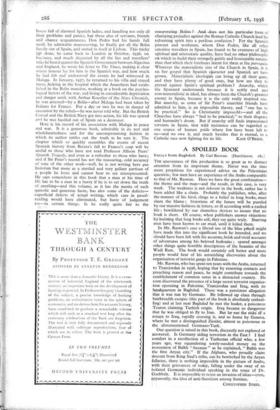A SPOILED BOOK
Escape from Baghdad. By Carl Raswan. (Hutchinson. r8s.)
THE unevenness of this production is so great as to distract attention from its important theme. Never was the time more propitious for experienced advice on the Palestinian question; few men have an experience of the Arabs comparable to that of Mr. Raswan. Here we have the great combination— the theme and the man—and the result, in this case, is very weak. The weakness is not inherent in the book, rather has it been added like a chain. Probably the publisher, who, after the manner of his kind, clings to a belief in long books, must share the blame ; historians of the future will be puzzled by our massive fashions in letters, so ill according with a riistie4 life ; bewildered by our shameless devices to insure that no book is short. Of course, when publishers answer objections ;b3iinsisting that long books sell, they say quite truly. Starving men have been known to eat mud, until it killed them. In Mr. Raswan's case a liberal use of the blue Obeli might have made this into the significant book he intended, and we should have been left with his accurate, brisk and vivid accounts of adventures among his- beloved bedouins ; spared amongst other things quite horrible descriptions of the beauties of the Wadi Ram. The book would certainly sell better and more people would hear of his astonishing discoveries about the organisation of terrorist gangs in Palestine.
Mr. Raswan, who has spent ten years with the Arabs, returned to Transjordan in 1936, hoping that by renewing contacts and preaching reason and peace, he might contribute towards the establishment Of common sense in a distracted country. He soon discovered the presence of a large secret terrorist organisa, lion operating in Palestine, Transjordan and Iraq, with its headquarters in Baghdad. There was a persistent allegation that it was run by Germans. He followed up clues through hairbreadth escapes (this part of the book is absolutely enthral- ling) and at last near Baghdad he met the leader, a poisonous Teuton_ claiming Turkish origin. Iraq became so dangerous that he was obliged to fly to Iran. But her ran the kiski of a retum to Iraq, rapidly crossing it, and so home by Geneva, where he met a distinguished Zionist, almost as poisonous as the aforementioned Germano-Turk.
One question is raised in this book, discreetly not explored or answered. Is Germany aiding terrorism in the East ? I find comfort in a recollection of a Turkestan official who, a few years ago, was squandering sorely-needed money on the restoration of Balkh "because" as he explained, "Balkh was the first Aryan city." If the Afghans, who proudly claim descent from King Saul's tribe, can be bewitched by the Aryan fallacies, there is nothing impossible in the picture of Arabs, with their grievances of today, falling under the sway of an isolated Germanic individual speaking in the tones of Dr. Goebbels. ft is impossible to resist an invasion of ideas—even, apparently, the-idea of anti-Semitism among Semites. ,
CHRISTOPHER SYKES.










































 Previous page
Previous page